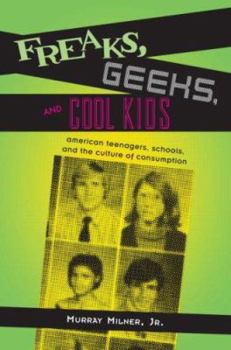Freaks, Geeks, and Cool Kids: American Teenagers, Schools, Andt He Culture of Consumption
Select Format
Select Condition 
Book Overview
In Freaks, Geeks, and Cool Kids, Second Edition, award-winning sociologist Murray Milner tries to understand why teenagers behave the way they do. The first edition drew upon two years of intensive... This description may be from another edition of this product.
Format:Paperback
Language:English
ISBN:041595391X
ISBN13:9780415953917
Release Date:June 2006
Publisher:Routledge
Length:305 Pages
Weight:1.00 lbs.
Dimensions:0.7" x 6.1" x 9.0"
Customer Reviews
4 ratings
Excellent Service
Published by Thriftbooks.com User , 18 years ago
The book was in very good condition. It was like new. Fast and speedy delivery.
childhood revisited
Published by Thriftbooks.com User , 18 years ago
Everything is traced back to a struggle for power and I like having that as a root throughout the book. I am only 25 and a lot of the elements of childhood reflected in the book are relatively fresh in my memory. I frequently found myself saying "ohhh" and wondering how I missed a lot of this. It drove me nuts, though, as I realized how difficult it would be to emerge from these behaviors and has kept me up a few nights. The previous reviewer must have been somewhere different than I because the book hit many nails on their respective heads (haha).
Big ideas with big implications
Published by Thriftbooks.com User , 19 years ago
Professor Murray Milner, Jr. asks "Why do American teenagers behave the way they do?" His new book, Freaks, Geeks, and Cool Kids, examines a list of negative behaviors: "Why are many teenagers obsessed with who sits with them at lunch, the brand of clothes they wear, what parties they are invited to, the privacy of their bedrooms, the intrigues of school cliques, who is dating or breaking up with whom, what is the latest popular music? Why have alcohol, drug use, and casual sex become widespread?" Some people assume that teen troubles are just the result of hormones, psychological development, race, or class, but Dr. Milner rejects that notion. He zeroes in on the basic nature of compulsory, age-segregated education. Milner argues that if we want to understand teens, we must "focus on the way adults have used schools to organize young people's daily activities, and the teenage status systems that result from this way of structuring their lives." Milner claims that students in high schools behave the way they do because they seek "status." In an effort to be popular with their peers, they divide themselves into groups like "preps" and "jocks" at one end of the social scale and "freaks" and "geeks" on the other. Freaks, Geeks, and Cool Kids is serious sociological research, but remains quite readable. The book unravels the mysteries of food fights, varsity letter jackets, drinking parties, and all the other marks of "youth culture." The strength of Milner's work lies in his ability to connect all these disparate dots into a coherent pattern, and then show how the pattern of the public high school is driven by the overarching quest for status. According to Milner, human beings tend to seek one or more basic kinds of power. The three main options are economic, political, or status power. Consider, for example, Bill Gates, President Bush, and Pope John Paul II. Each of these three exercises a vast amount of power, but in three different forms. For many people, status can be just as important as money or politics. When large numbers of people organize themselves around the pursuit of status (rather than money or political power), they form what Milner calls a "status system." Familiar status systems are the British aristocracy, the American South before 1860, and India's caste system. Much of Milner's life work was done in India and Bangladesh, where he studied the sociology of native Hindu cultures. Traditional Indian society is rigidly divided into different castes, with those at the highest level (Brahmins) rigidly separated from the lower tiers of society, all of which, in turn, look down on the "untouchables" at the bottom of the social structure. In his previous work (Status and Sacredness: A General Theory of Status Relations and an Analysis of Indian Culture) Milner challenged the assumption that India's caste system is the product of unique cultural circumstances. He tried to explain the factors that would lead people to develop suc
Reads like a Ph.D thesis
Published by Thriftbooks.com User , 19 years ago
Although a very interesting sociological study, this book reads more like someone's doctoral thesis or a sociology textbook. It's full of tiny print on shiny paper, interview and study results, footnotes -- very dry and detailed. The precis is well-documented and explained that adolescent consumerism is fostered by the "in" teens themselves, not the other way around. But the book makes it seem as if no teen can be more than a jerk if he/she attempts to avoid or scorn the dominant culture. That's a sad commentary on the need to conform in an age of diversity and, we hope, increased tolerance. This is a pretty heavy read, definitely not entertainment.





